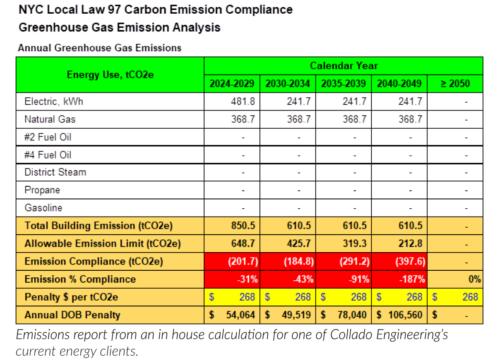Carbon Emissions Reporting: NYC Local Law 97
March 9, 2023 Newsroom
Starting in 2024, all NYC buildings over 25,000 square feet must report their annual carbon emissions by May 1st of each reporting year. A building’s emissions score is calculated based on its energy benchmarking data (Local Law 84) and compared to an emissions limit set for each type of building.
Why do you need to do it?
It is mandatory for all NYC buildings that exceed 25,000 square footage. Knowing your building’s carbon emissions will also help target improvements to reduce those emissions.
What does the process entail?
- A registered design professional must certify all Carbon Emissions Reports which are based on the building’s associated energy benchmarking dataset. It is imperative to ensure that your building’s annual energy benchmarking is accurate.
- A registered design professional must certify each property type and associated gross square footage of the building. For a multi-use building (e.g., residential, retail, school, etc.), the overall carbon emissions limits are calculated based on each different occupancy group or property type (as defined by the U.S. EPA Portfolio Manager).
- Building owners must report all energy consumed or fuel combusted on premises. This includes fuels typically not provided by a utility company such as propane, coal. diesel, etc. It also includes fuels used for normal testing of emergency or stand-by power generators.
Are there financial penalties?
There are three types of potential annual penalties:
- If a building exceeds its carbon emissions limits, NYC Department of Buildings will assess a fine for the excess emissions to the building owner. In 2025, the fine will be $268 per ton of CO2 each year.
- Failure to submit a certified emissions report will result in an automatic violation of $0.50 per building gross square foot for each month that the violation is not corrected (for up to 12 months).
- Submitting a false report is a misdemeanor and is subject to a fine of $500,000 and/or imprisonment of no more than 30 days.
How can building owners improve their carbon emissions now?
- Check that your energy benchmarking is correct, identify all space categories correctly, and account for “all” energy use.
- Understand how and where you are using energy in your building and reduce where you can.
- Retro-commission existing systems to ensure they are operating as efficiently as possible.
- Replace old, inefficient systems with high efficiency replacements taking advantage of utility incentive programs and tax credits.
- Remember that decarbonization does not mean total electrification. If not evaluated correctly, you may save on emissions fines but gain an enormous electricity bill.
How can Collado Engineering’s Local Law 97 services help building owners, operators, and managers?
- Collado Ensures successful emissions report submission. our expert team will resolve NYC DOB comments and challenges after submission as the building owner’s representative.
- Collado’s energy team will certify your tenant spaces to ensure the occupancy type and gross square footage are accurate to avoid unnecessary penalties.
- We can help identify potential emissions reduction improvements with comprehensive energy auditing and design services.
- We can help owners apply for financial assistance via the NYSERDA FlexTech Program, NYC Accelerator services, or other utility rebate programs.
